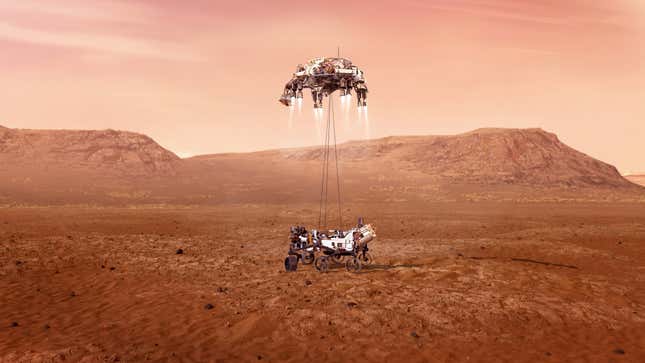
Nothing on the hills seems to be alive, so the rocky terrain of Mars will be filled with the sounds of solitude when the NASA’s Perseverance rover lands in Jezero Crater next month. One of the rover’s many tasks will be listening to the Martian environment with microphones—the first effort at acoustic data collection made by any spacecraft on Mars.
Perseverance is scheduled to land in Jezero Crater on February 18 and will be outfitted with two microphones. One is attached to the rover’s frame, just above one of its six wheels, and the other sprouts from the face of the rover’s SuperCam, the optical element that gives the rover much of its 7 feet in height. SuperCam looks a bit like a one-eyed WALL-E, with a new paint job, an offset lens, and a pair of keen ears, even if there’s no one around to listen to.
The Mars-bound microphones are “off-the shelf components,” said Baptiste Chide, a planetary scientist at NASA’s Jet Propulsion Laboratory, in a video call, “but they were tested to survive the launch, to survive the cruise to Mars, and to survive the descent, the entry, and the landing.”
Chide said that the body-bound mic—ensconced in a mesh to protect it from Martian dust—will record the abrasive sounds of entering Mars’ atmosphere and landing on its surface, while the SuperCam’s mic will record the sounds of quotidian Martian life, as Perseverance goes about splitting and vaporizing rocks and rolling around its landing site, where it will be for its first two years on the Red Planet.

Mars presents a unique acoustic environment to test, test, 1-2-3, due to the planet’s atmospheric pressure, that atmosphere’s content, and its temperature, all of which differ drastically from the situation here on Earth. (This goes for any of our planetary neighbors, each of which is a unique riff on an inhospitable deathtrap). On Mars, a frigid, carbon dioxide-heavy atmosphere about 1% as dense as Earth’s creates a soundscape that Chide compares to hearing all sound through a wall. As Katherine Wu described it well in a blog post for Harvard University:
The atmosphere of Mars isn’t particularly friendly…This combination is the opposite of the hot, thick air on Venus, and our voices would have a lower pitch due to the icy temperatures and huskier from the slower speed of sound… that is, if we could hear them at all. On Mars, sound would travel at a lower speed through much more absorptive gas. You could be standing thirty feet from a shrieking banshee and hear next to nothing.
If your next-door neighbor were bumping EDM, you’d feel the bass much more than other frequencies, which would have difficulty passing through the sound barrier of a wall. The same could be said for sound on Mars. A firework set off on the Red Planet, Chide said, would have a lower pitch, and the sound would take longer to reach your ear. “We won’t have fireworks on Mars, hopefully,” he said.
Of course, all this acoustic talk assumes a successful landing on Mars. It will be a long, lonesome journey through mostly silent space that culminates in a brief, treacherous touchdown. Even once safely deposited on the ground, the rover will need to navigate the unpredictable Martian terrain. As the ill-fated InSight mole recently demonstrated, you never know what might go wrong on Mars.
Should all go smoothly, the audio data sent back by Perseverance will give us a first listen to the planet’s soundscape. Let’s hope they get a clear recording of one of the mission’s biggest moments: the first helicopter flight on another planet.